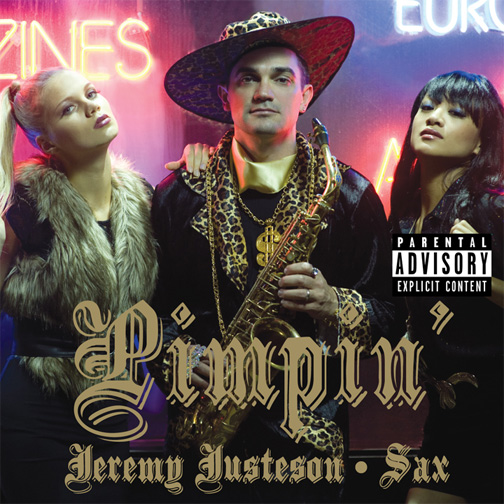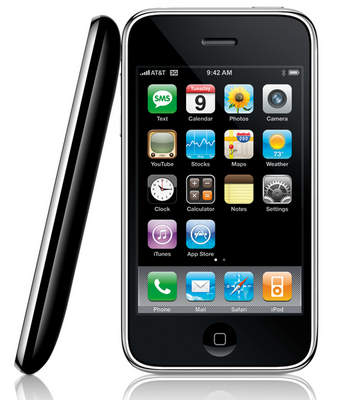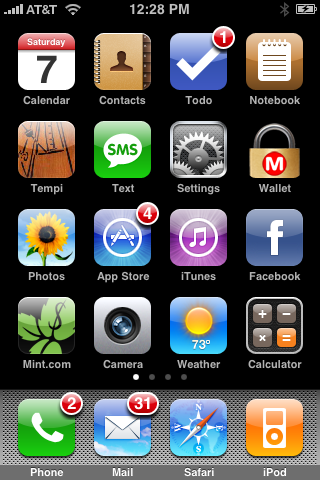 I blogged a while back about what I wished the iPhone would have, before it's debut. Of course, almost no one—including me—anticipated how cool it would actually be: it's even better than some of the, intriguing, whimsical ideas our Apple-loving community came up with.
I blogged a while back about what I wished the iPhone would have, before it's debut. Of course, almost no one—including me—anticipated how cool it would actually be: it's even better than some of the, intriguing, whimsical ideas our Apple-loving community came up with.
As the dust finally settles, I am noticing that there are many features the iPhone doesn't have, some frivolous, but some potentially very useful. A few are so important to me that I will hold off purchasing an iPhone until they are implemented.
To Do List
I haven't seen much written about this, but I use iCal's To Do List feature all the time. Am I the only one? Why is this not included? Some other features I could care less about (like the Stocks button), but this one is crucial to my personal workflow. I don’t want to have to access the web for my Do List (what if I'm on an airplane and think of something I need to do?), I want to use the one I’ve been using that’s attached to iCal.
iTunes Music Downloads
I should be able to download music from iTunes right onto the iPhone, and it should automatically upload to my computer when I sync.
Sharing Music
Some people have written that they want music sharing, a potentially great feature. I would love to be able to beam my music, right onto someone else's iPhone. Obviously, copyright infringement is an issue (i.e. how many devices can be authorized for a piece of music), which is probably why this feature doesn't exist yet. Modern technology could solve this if we charged monthly micro-payments to someone's account as each tune is shared more than the basic amount. We could also prevent second generation sharing: if you share it with one person, that individual can't then share it with someone else. Or, something could be shared for a limited amount of time, say, a week or a month, and then be disabled until you purchase it outright.
Personalized Ring tones
I would love to customize my ring tones. The available ones are fine, but every other cell phone allows this, why not the iPhone? Hell—I should be able to create my own ring tones, easily, right on the iPhone. Maybe someone out there can design an iApp to do this.
Portable iApps
They are being developed as I write this, but there are a few specific pieces of music-related software I would love to see, such as a metronome with a tap feature (like the Dr. Beat) and odd-meter capability. A tuner would also be nice. For all the non-music geeks out there, the most useful applications would probably be either productivity tools, such as something that produces MS Word files and/or PDFs and then beams or stores them, or file sharing software.
More Storage
The iPhone should not only be able to store regular files (like a portable hard drive) but I want it to also be able to play as many songs as the best iPod. Granted, it's got a lot of storage already, but in this case, more is better.
Replaceable, Swappable Battery
Why did they build in battery that can't be accessed by the user? We should be able to easily replace the battery once it's drained.
Credit Card
Imagine swiping your phone to pay for a purchase, instead of carrying around a whole wallet full of credit cards. Don't laugh: this is already possible in Japan via RFID tags. Some normal plastic credit cards in the US even incorporate RFID tags so cards can be waved rather than swiped. However, I think biometrics will eventually replace cards altogether, but this is a great idea nevertheless.
RSS News Reader
This is a great idea I saw on another wish list. This would alleviate having to surf the web for news text. It would be great to be able to access news and blogs via a continuously updated, easy to read list. It would also be great if read/unread and flagged/unflagged status could be synced with work and home computers. Offline support would also be nice, so material could be read when on an airplane and/or where mobile access in limited or impossible.
iChat
SMS but not iChat? What's up with that? Maybe Cingular forced them not to implement this, but it really needs to happen. It's only a matter of time before we can bypass phone companies and their ultra-expensive SMS options. Instant Messaging specifically designed for the iPhone would be very cool. Perhaps it could incorporate voice and video as well, over WiFi. Maybe Skype will tackle this.
Lower Price
This is a given: the price needs to eventually drop. This is a lot of money to pay for a phone, even this one, and it's a huge barrier for millions of potential converts.
Different Service Providers
Some people are already figuring out how to "unlock" iPhones, but it will still be relieving when other service providers are able to sell them. I know, Steve Jobs and Apple had to do it this way, and the other phone companies couldn't see the light or were too stubborn, or whatever, but we can all hope.
Better Camera
Sure, cell phone cameras have traditionally never that great, but why can't Apple buck the trend and build in an amazing camera? Not a full-fledged professional camera, just something that produces prints that are reasonably good, not just pics that are really only good enough to beam to someone else.
Rotating Lens (or Lens on Both Sides)
Someone else blogged about this, and it's an intriguing idea: "the camera lens is currently located on the backside of the phone which makes it easy to take pictures and preview them on the screen. However, it would be really useful if the lens were rotatable to allow you to point it at yourself. It would then turn the iPhone into a killer video iChat device."
Voice Recognition
I saw this on another post: "this would allow you to interact with the iPhone while driving. 'Computer: show the location of my next appointment.'" This could also act as a translator, alleviating having to include a bulky dictionary on your iPhone.
Voice Recording
Sometimes when I'm driving, I have an idea, but can't pull out my phone. How about an iApp that translates your recorded voice into text and either saves it as a note or a To Do or sends it to you as an email message?
Hand-writing recognition
This would be a nice option and make text entry easier for some people.
Hold Music
It would be cool if you could pick a song from your phone (in my case, my music, since I am a composer) to act as the music someone hears when they're on hold during call waiting.
GPS Technology
This is an ever-expanding market that is becoming more popular every day. GPS technology is so much more practical than carrying around geeky-looking maps.
Seamless International Calling
I don't want to have to think about whether my phone will work when I travel from country to country, what each country costs for phone calls, etc. I should be able to easily choose options on the phone company's website, how much I’ll pay, which countries I'm traveling to, how many minutes I need, billing options, etc., then be able to travel wherever I want, without worrying about anything, kind of like driving through an E-Z Pass toll booth on a U.S. highway.
Wireless TV/FM/AM Signals
This seems like a no-brainer. It would be amazing to be able to mingle TV, radio and web-based channels "webcasts") and sites together in one, customized list. However, I do believe that FM/AM will eventually die out, as it's so much more efficient to listen to what you want, when you want.
Portable Projector
Perhaps this could be something you could add as a clip-on device. Not everyone would need or want this, but I've seen it mentioned elsewhere, and it does seem pretty interesting.
Flash Support
As much as I hate Flash, many websites use it. It's obvious that we should be able to see Flash on an iPhone.
Some of these ideas are useful to some and not others, but that's OK: we all have different wants and needs. Hopefully they will be implemented sooner rather than later. Until then, I'll hold off on purchasing an iPhone until Apple incorporates the iCal-based To Do list.
Any other ideas? Let me know...




 If you have any musical taste whatsoever, you probably do not rely on radio for your daily musical fix. Radio is useful for traveling, but it has always been limited, especially while driving across state lines, through forests and in back woods areas. Broadcasts cut out every few miles, but does this really matter? Most stations' programs are awful, particularly now that they are almost all controlled by
If you have any musical taste whatsoever, you probably do not rely on radio for your daily musical fix. Radio is useful for traveling, but it has always been limited, especially while driving across state lines, through forests and in back woods areas. Broadcasts cut out every few miles, but does this really matter? Most stations' programs are awful, particularly now that they are almost all controlled by 




 Last night I was cleaning our kitchen, and since I had not given it a once-over in a while, I decided to clean our coffee machine. It wasn't that grimy, but fresh is best, at least in my book, so I like to go the extra mile.
Last night I was cleaning our kitchen, and since I had not given it a once-over in a while, I decided to clean our coffee machine. It wasn't that grimy, but fresh is best, at least in my book, so I like to go the extra mile. I blogged a while back about what I wished the
I blogged a while back about what I wished the 
 "You hear that Mr. Anderson?... That is the sound of inevitability... It is the sound of your death... Goodbye, Mr. Anderson... "
"You hear that Mr. Anderson?... That is the sound of inevitability... It is the sound of your death... Goodbye, Mr. Anderson... "